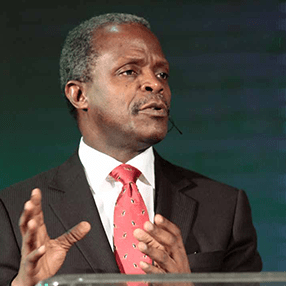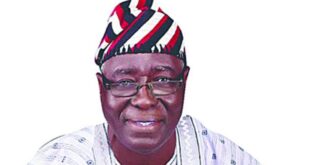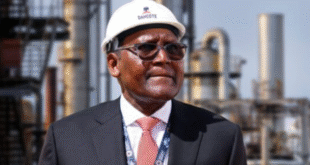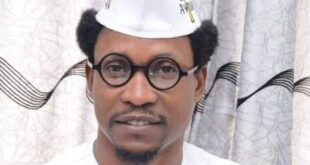BY ABUSATAR HAMED
ABUJA: Vive President Yemi Osinbajo (SAN) has said if workers from poor and rich backgrounds received the same education, the disparity between the two in terms of their inequality in earning is decreased by as much as almost 40%, saying that education reduces economic inequalities.
According to a release e-signed and made available to StarTrend Int’l magazine & www.startrendinternational.com by Laolu Akande, Senior Special Assistant to the Vive President on Media and Publicity, Prof. Osinbajo stated this speech by his on Thursday, November 28, 2019 at the 2019 Nigeria Annual Education Conference.
His words, “There is a logical link between education and poverty, and of course extreme poverty and mortality is also connected without any doubt at all. It is up to us, not just the government but every one of us must feel mandated by history to do something concrete about the education of our children.”
Read full speech below.
SPEECH BY HIS EXCELLENCY, PROF. YEMI OSINBAJO, SAN, GCON, VICE PRESIDENT OF THE FEDERAL REPUBLIC OF NIGERIA, AT THE 2019 NIGERIA ANNUAL EDUCATION CONFERENCE ON THE 28TH OF NOVEMBER, 2019
PROTOCOL
It really is a special pleasure to join you at this 2019 Nigeria Annual Education Conference. I think that the theme is a very appropriate one, but it comes at a time when our nation is confronted with crucial choices that have to be made as we plot our path to what is possibly the most significant two or three decades in our national history.
In a few decades, we will possibly be the third most populous country in the world. We would also have one of the youngest populations in the world. And we stand a chance of becoming the undisputed most developed African nation on earth.
Or perhaps one of the most advanced economies in world. We are in that fortunate position because of our natural endowments, the incredible possibilities that technology and innovation offer to redefine our economy for growth, and the real opportunities to leapfrog over generations just on the account of technology in this whole development story.
But most importantly, the potential of our people, the potential of the Nigerian person, children today and so many, who are coming behind. But we are also confronted by fundamental challenges. A large population of out-of-school children, and a huge percentage of that number who are girls, of course we know that the female population is about 50% of our total population; some even say more than 50%. And then, there is a dearth of teachers, complicated by poor quality of teachers.
In addition, years of neglect of education at both Federal and State levels resulting in very poor infrastructure, very little has been invested compared to the overall picture. The other challenge is that of extreme poverty and its innumerable consequences for health, wellbeing of the majority of Nigerians and resulting vicious cycle of low productivity, poor human development outcomes and increasing poverty.
The challenges of poverty and poor educational outcomes are directly connected. A UNESCO Global Education Monitoring Report which details that connection and provides some important evidence on the impact of education on individual’s earnings and economic growth and among other things that the report found is that:
Education reduces poverty and that absolute poverty could be reduced by as much as 30% from learning improvements alone. It says also that education increases individual earnings, as it increases earnings by roughly 10% per each additional year of schooling. Indeed, for each $1 invested in an additional year of schooling earnings increase by $5 in low-income countries and $2.5 in lower-middle-income countries.
Education reduces economic inequalities. It was found that if workers from poor and rich backgrounds received the same education, the disparity between the two in terms of their inequality in earning is decreased by as much as almost 40%.
Education promotes economic growth as educational attainment explained about half of the difference in growth rates between East Asia and Sub-Saharan Africa. There is no question at all that there is a direct link between education and extreme poverty that we find ourselves in.
In responding to this twin challenge, President Buhari made two crucial commitments within the same month. On June 12 2019, he declared that the crucial objective of our administration in this second term is to take a 100 million Nigerians out of poverty within the next ten years.
And on June 20th, 2019 while inaugurating the National Economic Council, he also made another commitment which is that the Federal Government will work with the States, to ensure the enforcement of free and compulsory education in the first nine years of a child’s school life. Because this is a law, failure to ensure the enforcement of free and compulsory education is criminal and punishable by imprisonment.
So, to resolve the educational challenge is to resolve the poverty challenge. The choices that lie before us are clear; investing in relevant education, by that I mean education that would equip the child with the best possible skills. Today, digital, civic and innovative skills, education that equips to function optimally in a world that is increasingly been defined by the developments in what is called the “Fourth Industrial Revolution.”
The policy responses led by the Ministry of Education, in my view, have been thoughtful and robust. The Education for Change Strategy (2018-2022) deserves commendation. Through this approach, deliberate steps have commenced action in certain priority areas: I will mention just a few of them:
Out-of-School Children
Youth and Adult Literacy
Science, Technology, Engineering, Arts and Mathematics (STEAM) and Technical, Vocational Education and Training (TVET)
Basic Education
Teacher Education, Capacity Building and Professional Development
Curriculum and Policy Matters
Tertiary Education
Education Data and Planning
Information and Communication Technology (ICT) in Education
Library Services in Education.
We must immediately acknowledge that the Federal Government’s constitutional role in the first nine years of a child’s life is minimal. It is primarily the role and responsibility of States and Local Governments. States simply have to prioritize basic education, by making more funding available.
Every child must have basic education at the very least. It is about the future of the citizens of every State. However, the Federal Government considers that it has a crucial role to play, especially in guiding, inspiring, coordinating, co-funding and complementing the basic education strategy.
And this must be so, as it is important for us because the whole question of human capital development is the responsibility of the central government. And whatever the outcomes look like, the centre takes the blame, while the States are absolved of blame.
We must continue to find creative ways of dealing with the huge problem of out-of-school children. We have seen an almost 40% rise in school enrolment in schools across the 34 States, where the Federal Government has the Home Grown School Feeding Programme going on. But of course, that kind of situation has also led to overcrowding of classrooms, which creates another set of problems with regard to school infrastructure and the ability of children to learn in such conditions.
Some of the latest figures show is that we have 22.4million children in 406,000 classrooms in public primary schools in Nigeria. This is about 55 children in a classroom which almost doubles the accepted standard of 30 children per class. This means that we will just have to find the resources to build additional classrooms across the country so that children can learn in optimal conditions.
It is evident that even with the best of effort and given the resource that we have and the population growth, which is slightest under 3% annually. We just have to think out of the box especially using technology and digital means to reach a growing number of children. This will also place a huge demand on resources both at the national level of ensuring wider broadband coverage and also at the school level in terms of the availability of computers and the kind of electronic devices that could help.
These days, mobile technology is helping a great deal, without necessarily using broadband as such. There is a great deal that can be done using USSD systems. Our national fibre coverage is still low with only 45% of the population within 5 kilometres proximity to a fibre network which means over 100million people are outside fibre reach. At the more granular level, only 3,600 public primary schools out of 63,000 have access to computers. The ratio is a bit better in public junior secondary schools where just over one third have access to computers.
Fortunately, we already have arrangements to support State Governments in this area, through the funds made available to UBEC as a first-line charge in the budget. The budgeted amount for UBEC in 2019 was N112.47billion. As the Honourable Minister has said, we will be working closely with States to enable them to access UBEC funds so as to build schools and equip them appropriately. Improving access and amount of funding by reviewing the process and conditionalities for accessing UBEC Intervention Funds by States and FCT with the aim of increasing accountability is certain to generate more impact in the near term.
Some of the States of the Federation have shown full or near-full accesses to UBEC Intervention Funds. And a lot of progress has been made in terms of infrastructure, teacher development and teaching materials. With regard to digital infrastructure, a major priority of the Federal Government is to achieve 100% broadband coverage by 2023. This is a major pillar in our second-term agenda.
In implementing our N-Power Programme, one of the Social Investment Programmes where 500,000 graduates are either teaching in schools or working as health care officials, we found that instructional material and training could be made available to volunteers of the scheme via their electronic tablets that are provided for them or through the open portal that contains all of the instructional material.
This has proven to be a way to train on scale or at least supply additional materials after face-face training has taken place on the kind of scale that would be needed to do the kind of work needed for the size of our population and number of teachers that we need.
Getting children to school and ensuring that they are instructed in appropriate surroundings with the right equipment is just one part of the equation. We also have to ensure that they stay in school and are provided with suitable instruction while there. While the completion rate for primary schooling is about 86% that of Junior Secondary Schools is 42%. In fact, there is a great gender imbalance at this level with female completion rates at just 34%.
To keep children in school for the entire period of basic education, in addition to providing free public education and enforcing mandatory attendance, it has been proposed that there should be a requirement of evidence of completion of the first three years of secondary school for participation in the N-Power non-graduate apprenticeship schemes such as N-Power Build.
This is an apprenticeship scheme that allows people without secondary school education to learn skills such as carpentry, plumbing, masonry, electrical, welding, and baking amongst others.
Evidence from around the world and even domesticall y has shown that the quality of educational outcomes is possibly more dependent on the quality of teaching. Some of the best practices we drew from showed that students placed with high performing teachers performed several times and, in some cases, 3 times better than those with low performing teachers.
I will not repeat the detailed work plan the Honourable Minister has set out, but I must add that we intend to diligently adopt continuous professional development for teachers; linking it to new opportunities; linking teacher training to revised curriculum using a scripted approach; as well as introducing learning assessments and performance management. This will provide motivation for low skill teachers and a clear process for remedial actions to improve performance.
Improving teachers support through mentoring is also important, in addition to improving teacher capacity. We will also be providing support by building an ecosystem that supports learning by teachers. This requires engaging schools through the various Ministries of Education, as well as school headmasters.
The intention is to give teachers a new experience about how they learn and how they learn to teach. The training would be to enable teachers to take a multi-disciplinary approach to teaching and helping to solve real-life problems. This experience should be complemented with not just teachings aids, instructional materials, but much greater use of technology.
So, the policy is to use the Science, Technology, Engineering, Arts and Mathematics (STEAM) curriculum in primary and secondary schools the emphasis being on the development of skills in cross-disciplinary, critical and creative thinking, problem-solving and digital technologies which are essential in all 21st-century occupations.
Where we are today is critical and I must thank very much the international donors and international partners for the excellent work they are doing. Just looking at what is going on in Bauchi, Kebbi, Sokoto and several northern states, it’s incredible. I really want to thank and commend our international partners for the very great works they are doing. As they say, it takes a whole village to train a child, and I think this global village in helping to train the Nigerian child is greatly appreciated indeed. Thank you very much.
But I must say that for the Federal Government, State Government, Nigerian civil society groups and the Nigerian private sector, we must take ownership of this most important feature of our lives. This is for us existential; the education of our children is existential for us. As has been shown, there is a logical link between education and poverty, and of course, extreme poverty and mortality is also connected without any doubt at all. It is up to us, not just the government but every one of us must feel mandated by history to do something concrete about the education of our children.
We cannot leave it to the government, every one of us has a role to play and I really hope that in the next few years, by the time we come back for another education conference, that we are seeing greater participation of the Nigerian civil society and the Nigerian private sector in the educational sector. Especially with funding, I must commend OandO, they are doing excellent work, but we need to see much more private sector involvement, especially the Nigerian private sector.
I would like to thank you very much for listening to me and also to say that we in the Federal Government remain very committed to ensuring that education is given priority in practically everything that we do. We may not have that much money, but we have the heart and we are really committed.
Thank you very much.
 Startrend International Magazine For Your Latest News And Entertainment Gists
Startrend International Magazine For Your Latest News And Entertainment Gists





